Introduction
Mangoes, often revered as the epitome of tropical sweetness, have stirred a pot of controversy regarding their impact on blood sugar levels and weight management. Despite their delectable taste and vibrant color, concerns linger about whether indulging in this luscious fruit could lead to spikes in blood glucose and unwanted pounds. However, diving deeper into the nutritional profile and physiological effects of mangoes unveils a more nuanced reality. Let’s embark on a journey to demystify the myths surrounding mangoes and uncover the truth about their relationship with blood sugar levels and weight gain.

Dispelling the Myth:
Let’s address the elephant in the room: the fear that mangoes can wreak havoc on blood sugar levels. Yes, mangoes are naturally high in sugar, but before you banish them from your diet, consider this: the glycemic index (GI) of mangoes is moderate. This means that while they do contain sugar, it’s released into the bloodstream at a slower rate compared to high-GI foods like candy or white bread.
Furthermore, mangoes are also rich in fiber, which helps slow down the absorption of sugar and prevents sharp spikes in blood glucose levels. So, contrary to popular belief, enjoying a serving of mangoes as part of a balanced diet is unlikely to cause a drastic increase in blood sugar.
The Weight Gain Conundrum:
Another concern that often plagues mango lovers is the fear of packing on pounds. After all, with their deliciously sweet taste, it’s easy to overindulge in this tropical treat. But here’s the truth: mangoes, when consumed in moderation, can actually aid weight loss rather than contribute to weight gain.
How so? Well, for starters, mangoes are low in calories compared to other snacks of similar sweetness. Additionally, their abundance of dietary fiber prolongs satiety, curbing the urge to indulge in unhealthy snacks between meals. Additionally, mangoes are packed with vitamins, minerals, and antioxidants that support overall health and well-being.
The Power of Portion Control:
Of course, like any food, moderation is key when it comes to enjoying mangoes without worrying about your waistline or blood sugar levels. A serving size of mango is typically about one cup, diced. By keeping your portions in check and incorporating mangoes into a balanced diet, you can reap the benefits of this delicious fruit without the guilt.

Healthy Ways to Enjoy Mangoes:
Now that we’ve debunked the myths surrounding mangoes, let’s explore some tasty and nutritious ways to incorporate them into your diet:
- Mango Smoothie: Blend ripe mango chunks with Greek yogurt, spinach, and a splash of coconut water for a refreshing and nutrient-packed smoothie.
- Mango Salsa: Dice mangoes, tomatoes, onions, and cilantro, then toss with lime juice and a pinch of salt for a flavorful salsa that pairs perfectly with grilled chicken or fish.
- Mango Salad: Combine sliced mangoes with mixed greens, avocado, and grilled shrimp for a light and satisfying salad that’s bursting with flavor.
- Mango Chia Pudding: Mix diced mangoes with chia seeds and almond milk, then let it sit in the refrigerator overnight for a delicious and nutritious breakfast or snack option.
Conclusion:
Mangoes offer a delightful addition to your diet, providing not only a burst of tropical flavor but also a wealth of essential nutrients. When enjoyed in moderation, they can contribute to overall health and well-being. With their moderate glycemic index and high fiber content, mangoes are a satisfying snack choice that can help maintain stable blood sugar levels and curb cravings for unhealthy treats. So, savor the taste of summer guilt-free, knowing that you’re nourishing your body with a delicious and nutritious fruit.